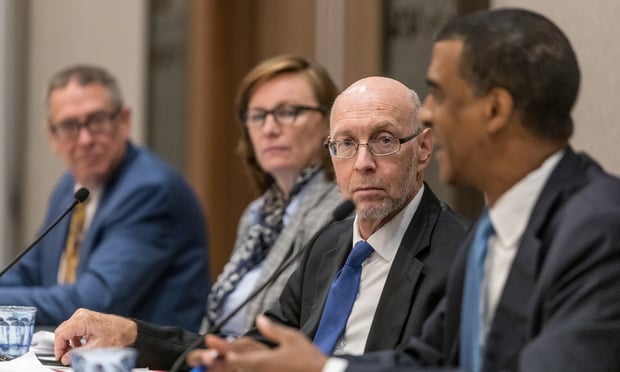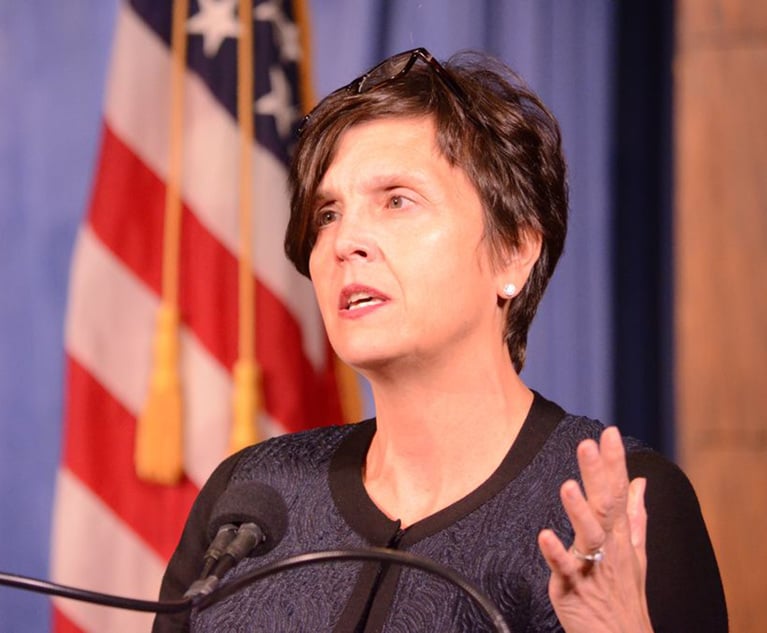Larry Wallace, Former Deputy Solicitor General and Courageous Civil Servant, Dies at 88
Harvard Law School professor Richard Lazarus called Larry Wallace's legendary footnote in a U.S. Supreme Court case "an act of extraordinary personal courage and professional integrity."
February 23, 2020 at 01:43 PM
6 minute read
 Office of the Solicitor General at the U.S. Department of Justice in Washington, D.C. (Photo: Mike Scarcella/ ALM)
Office of the Solicitor General at the U.S. Department of Justice in Washington, D.C. (Photo: Mike Scarcella/ ALM)
Former deputy U.S. Solicitor General Lawrence Wallace, who died February 13 at age 88, is being remembered as a fearless civil servant who, like the Justice Department lawyers who recently resigned from the Roger Stone case, resisted pressure from higher-level officials.
Wallace retired from the solicitor's office in 2003 after arguing 157 cases before the U.S. Supreme Court, a 20th century record.
In 1982, he included a memorable footnote in a brief signaling that he would not support the Reagan administration's position in Bob Jones University v. United States. At issue was the Internal Revenue Service policy that denied tax-exempt status to institutions that discriminated by race. The Reagan White House wanted to oppose that policy in the government's brief.
When Solicitor General Rex Lee recused, the task of signing the brief fell to Wallace. Wallace did so, but insisted on adding the footnote, which angered Reagan administration officials. The Supreme Court ultimately upheld the policy.
The late Erwin Griswold, who served as the U.S. solicitor general from 1967 to 1973, told The Washington Post in 1982 that Wallace's action was "an attempt to preserve the credibility of the office."
Wallace remained in the office, but he was relieved of handling civil rights cases for the government, and a new position of a politically appointed deputy solicitor general was created.
Harvard Law School professor Richard Lazarus on Saturday called Wallace's legendary footnote "an act of extraordinary personal courage and professional integrity." Lazarus continued: "The more recent action of the career Justice Department attorneys in resigning from the Stone prosecution to make clear their disagreement with orders from the Attorney General to withdraw their sentencing recommendation is strikingly reminiscent of Wallace's action."
Others who worked with Wallace praised him as a mentor of dozens of government lawyers during his 35-year career in the solicitor general's office.
"Larry was a dear soul, a wonderful colleague, and a mentor to many, many government lawyers," said Seth Waxman, former solicitor general and co-chair of the appellate and Supreme Court litigation practice at Wilmer Cutler Pickering Hale and Dorr. "His professional life was entirely dedicated to the interests of the United States and to the traditions and excellence of the office of the solicitor general. Larry elevated the spirits and sights of those of us who had the privilege to work with him."
 Michael Dreeben (center) speaking at an ABA event in San Francisco last week. (Photo: Jason Doiy/ALM)
Michael Dreeben (center) speaking at an ABA event in San Francisco last week. (Photo: Jason Doiy/ALM)Michael Dreeben, a longtime former deputy solicitor general who is now a partner at O'Melveny & Myers, remembered his job interview with Wallace.
"He served me coffee in a china cup, reminisced about the justices and gently pointed out that my writing sample had cited a Supreme Court plurality opinion as if it were the opinion of the court—all to let me know that the office had standards to live up to," Dreeben said. "He constantly reminded new attorneys that they had joined an institution with traditions to be upheld and standards to meet. His devotion to the office made him the living embodiment of its values: candor, accuracy and integrity."
As familiar as he was with the unwritten rules and etiquette of Supreme Court arguments, Wallace did not always acquiesce to the rapid-fire questioning of the justices.
Lawyers arguing before the court are schooled to drop everything and immediately respond to a justice's question, but Wallace sometimes bared his impatience and ignored that rule in favor of getting his own points across. He also had a somewhat haughty manner of speaking that did not always please the justices. In a post-retirement interview in 2003 with this reporter, Wallace said, "It's very hard to build anything with your argument when you are asked a question before you establish where you want to go."
Wallace also shrugged off the enduring practice of undergoing multiple moot courts before argument. He did not want to peak prematurely. "It's an idiosyncrasy of mine," he said in the 2003 interview. "Most advocates do benefit from them." Instead, he would take long walks in his Chevy Chase, Maryland, neighborhood to ponder the tough questions in the case: "You need to be very clear about how to formulate your key concepts. You can't be fumbling for words up there."
Wallace recounted a conversation with Justice Sandra Day O'Connor. He said that a Justice Department official once told him, "The trouble with you is that you think you work for the Supreme Court, not the administration." Wallace said O'Connor looked at him and said, "Well, you just go right on thinking that way."
And Wallace did just that. "Of course, you advocate the government's position," he said. "But there are times when it is necessary to bring things to the attention of the court, whether it helps your case or not. And that is what I did."
Read more:
At Roger Stone's Sentencing, an Apology From the Justice Department
'A Loss to the Pursuit of Justice': Praise for Roger Stone Prosecutor Who Resigned
'Slammed': What Has Driven Departures From Trump's Justice Department
Sotomayor Confronts Noel Francisco About Switched Position in Ohio Voter Case
US Justice Department Has a Duty to Defend—Only When It Doesn't
This content has been archived. It is available through our partners, LexisNexis® and Bloomberg Law.
To view this content, please continue to their sites.
Not a Lexis Subscriber?
Subscribe Now
Not a Bloomberg Law Subscriber?
Subscribe Now
NOT FOR REPRINT
© 2025 ALM Global, LLC, All Rights Reserved. Request academic re-use from www.copyright.com. All other uses, submit a request to [email protected]. For more information visit Asset & Logo Licensing.
You Might Like
View All
Skadden and Steptoe, Defending Amex GBT, Blasts Biden DOJ's Antitrust Lawsuit Over Merger Proposal
4 minute read
'Lack of Independence' or 'Tethered to the Law'? Witnesses Speak on Bondi
4 minute read
Law Firms Mentioned
Trending Stories
- 1Cleary Nabs Public Company Advisory Practice Head From Orrick in San Francisco
- 2New York Environmental Legislation in 2024
- 3Cravath Hires Paul Weiss Antitrust Co-Chair
- 4Contract Technology Provider LegalOn Launches AI-powered Playbook Tool
- 5Court of Appeals Provides Comfort to Land Use Litigants Through the Relation Back Doctrine
Who Got The Work
J. Brugh Lower of Gibbons has entered an appearance for industrial equipment supplier Devco Corporation in a pending trademark infringement lawsuit. The suit, accusing the defendant of selling knock-off Graco products, was filed Dec. 18 in New Jersey District Court by Rivkin Radler on behalf of Graco Inc. and Graco Minnesota. The case, assigned to U.S. District Judge Zahid N. Quraishi, is 3:24-cv-11294, Graco Inc. et al v. Devco Corporation.
Who Got The Work
Rebecca Maller-Stein and Kent A. Yalowitz of Arnold & Porter Kaye Scholer have entered their appearances for Hanaco Venture Capital and its executives, Lior Prosor and David Frankel, in a pending securities lawsuit. The action, filed on Dec. 24 in New York Southern District Court by Zell, Aron & Co. on behalf of Goldeneye Advisors, accuses the defendants of negligently and fraudulently managing the plaintiff's $1 million investment. The case, assigned to U.S. District Judge Vernon S. Broderick, is 1:24-cv-09918, Goldeneye Advisors, LLC v. Hanaco Venture Capital, Ltd. et al.
Who Got The Work
Attorneys from A&O Shearman has stepped in as defense counsel for Toronto-Dominion Bank and other defendants in a pending securities class action. The suit, filed Dec. 11 in New York Southern District Court by Bleichmar Fonti & Auld, accuses the defendants of concealing the bank's 'pervasive' deficiencies in regards to its compliance with the Bank Secrecy Act and the quality of its anti-money laundering controls. The case, assigned to U.S. District Judge Arun Subramanian, is 1:24-cv-09445, Gonzalez v. The Toronto-Dominion Bank et al.
Who Got The Work
Crown Castle International, a Pennsylvania company providing shared communications infrastructure, has turned to Luke D. Wolf of Gordon Rees Scully Mansukhani to fend off a pending breach-of-contract lawsuit. The court action, filed Nov. 25 in Michigan Eastern District Court by Hooper Hathaway PC on behalf of The Town Residences LLC, accuses Crown Castle of failing to transfer approximately $30,000 in utility payments from T-Mobile in breach of a roof-top lease and assignment agreement. The case, assigned to U.S. District Judge Susan K. Declercq, is 2:24-cv-13131, The Town Residences LLC v. T-Mobile US, Inc. et al.
Who Got The Work
Wilfred P. Coronato and Daniel M. Schwartz of McCarter & English have stepped in as defense counsel to Electrolux Home Products Inc. in a pending product liability lawsuit. The court action, filed Nov. 26 in New York Eastern District Court by Poulos Lopiccolo PC and Nagel Rice LLP on behalf of David Stern, alleges that the defendant's refrigerators’ drawers and shelving repeatedly break and fall apart within months after purchase. The case, assigned to U.S. District Judge Joan M. Azrack, is 2:24-cv-08204, Stern v. Electrolux Home Products, Inc.
Featured Firms
Law Offices of Gary Martin Hays & Associates, P.C.
(470) 294-1674
Law Offices of Mark E. Salomone
(857) 444-6468
Smith & Hassler
(713) 739-1250











